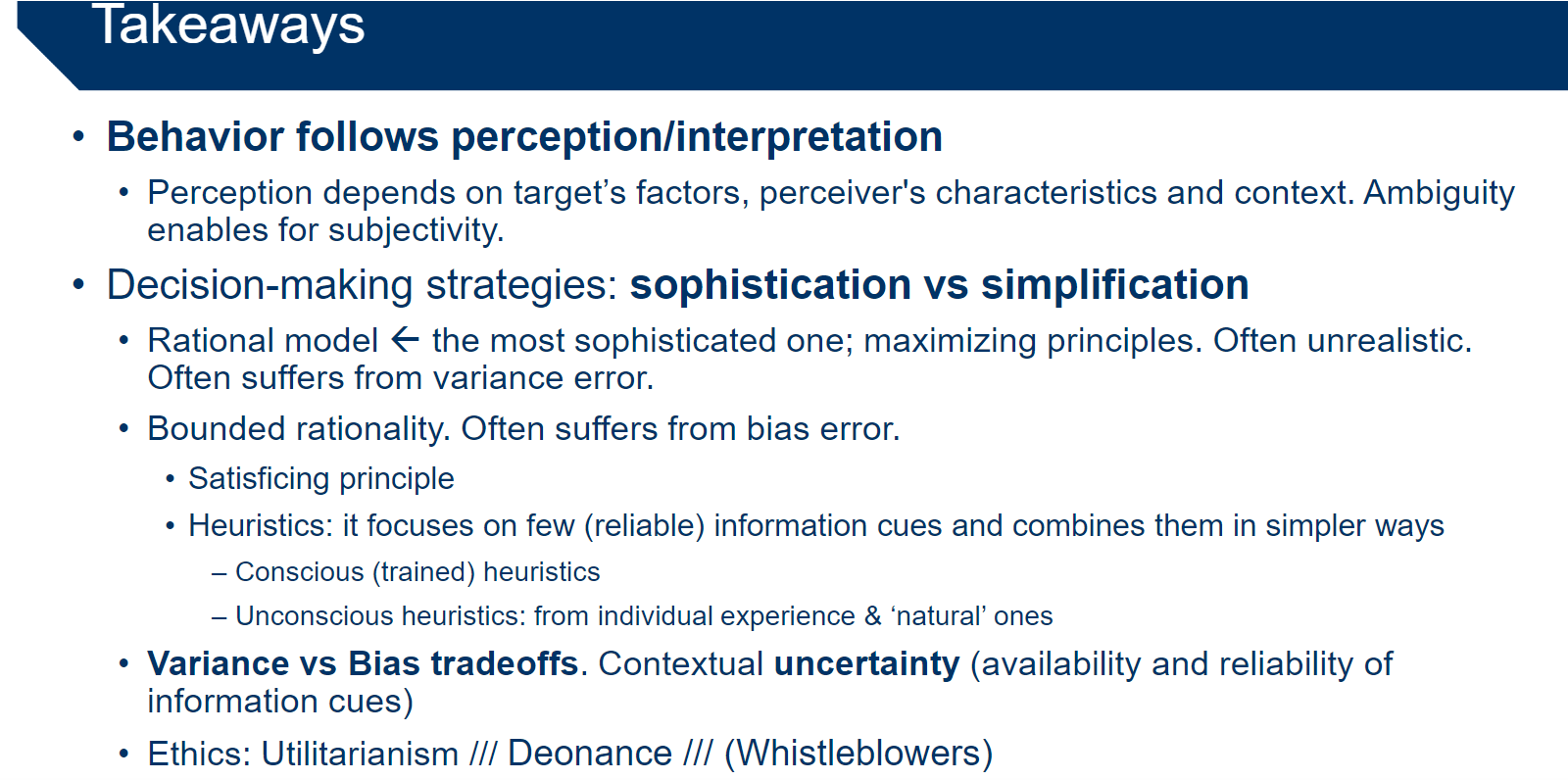OB Lecture 4, Chapter 6, Perception and Individual Decision Making
1/26
There's no tags or description
Looks like no tags are added yet.
Name | Mastery | Learn | Test | Matching | Spaced |
|---|
No study sessions yet.
27 Terms
Perception/Interpretation
A process by which individuals organize and interpret their sensory impressions in order to give meaning to their environment
Objective Reality
Sources that have an unclear meaning that enable subjective interpretations of reality
Attribution Theory
An attempt to explain the ways we judge people differently, depending on the meaning we attribute to a behavior. (Is an individual’s behavior internally or externally caused?)
Fundamental attribution error:
The tendency to underestimate the influence of external factors and overestimate the influence of internal factors when making judgments about the behavior of others
Self-serving bias
The tendency to attribute your succeses to internal factors and put the blame for failures on external factors. (Succes → je hebt het goed gedaan, Falen → het is de schuld van andere factoren)
Selective perception
The tendency to selectively interpret what one sees based on one’s interests, background, experience and attitudes
Halo effect
The tendency to draw a positive general impression about an individual based on a single characteristic(HALO = POSITIVE)
Horns effect
The tendency to draw a negative general impression about an individual based on a single characteristic. (HORNS = NEGATIVE)
Stereotyping
Judging someone based on one’s perception of the group to which that person belongs
Contrast effect
Evaluation of a person’s characteristics that is affected by comparisons with other people recently encountered who rank higher or lower on the same characteristics
Rational
A style of decision making characterized by making consistent, value-maximizing choices
Rational decision-making model(Definition)
A decision-making model that describes how individuals should behave in order to maximize some outcome(Onthoud: Rational → maximize outcome)
Rational decision-making model(Steps)
Define the problem
Identify the decision criteria
Allocate weights to the criteria
Develop the alternatives
Evaluate the alternatives
Select the best alternative(Highest utility)
Bounded rationality
A simplified process of making decisions by perceiving and interpreting the essential information cues(Onthoud: Bounded rationality → simple, minimized; good enough not perfect)
Heuristics
Mental shortcuts for solving problems in a quick way
Common Natural Heuristic: Confirmation bias
The tendency to seek out information that reaffirms past choices and current views, and to discount information that challenges them
Common Natural Heuristic: Availability bias
The tendency for people to base their judgments on information that is readily available to them
Common Natural Heuristic: Overconfidence Bias
A tendency to be overconfident about our own abilities or the abilities of others
Common Natural Heuristic: Anchoring Bias
A tendency to fixate on initial information from which one then fails to suitable adjust for other information
Common Natural Heuristic: Escalation of commitment
An increased commitment to a previous decision, despite negative information
Common Natural Heuristic: Risk aversion
The tendency to prefer a sure gain of a small amount than over a riskier outcome with higher payoff
Common Natural Heuristic: Randomness error
The tendency of individuals to believe that they can predict the outcome of random events
Common Natural Heuristic: Hindsight bias
The tendency to believe falsely, after an outcome of an event is known, that one would have predicted that exact outcome.(Ik wist dat dat zou gebeuren)
Common Natural Heuristics characteristics
Are prone to suffer from bias error
Can lead to some survival advantage
Decision Making: Utilitarianism
An ethical perspective in which decisions are made to provide the greatest good for all(Treinspoor dilemma)
Decision making: Deonance
A perspective in which ethical decisions are made because you ought to in order to be consistent with moral norms, principles, standards, rules or laws
Takeaways(Key points)
